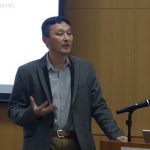[Report] In this seminar, we discussed opportunities and challenges in governing data-driven innovation for sustainable smart cities. In particular, we explored what kinds of data governance systems would be appropriate in maximizing innovation potential while minimizing risks to individual and communities. Case studies were introduced to examine the innovation systems for smart cities in Japan, the United States, and China to understand key knowledge domains, actors, and institutions that affect the development and deployment of various technologies and services for data-driven innovation. By looking at the current situation in China closely, our discussion focused on how the collection, management, and usage of data would affect the creation of data-driven innovation and how societal concerns about data security and privacy among the public can be addressed. We also discussed implications public policy and institutional design for data governance to facilitate innovation for sustainable smart cities.
Date : Tuesday 25 August, 2020
Time : 10:00~11:30 (at Japan local time)
Style: Online English lecture by Zoom (w/Japanese simultaneous interpretation by app INTERPREFY)
(Zoom URL will be announced to pre-registrants until the day before the Event)
Registration: Advanced registration required. Please fill in this Form and submit your registration.
(If you have difficulties in opening the form, please email us directly.)
[Overview] Smart cities play a crucial role in tackling many issues concerning urban sustainability. This ranges from reducing air pollution and increasing energy efficiency to mitigating traffic congestion and maintaining resilience to natural disasters. Data-driven innovation, including the Internet of Things, Blockchain and Artificial Intelligence, has significant potential to address these multifaceted and interdependent issues. Vast amounts of data are increasingly available from a diversity of sources through sensors and devices installed in buildings, automobiles and infrastructure across cities. Effective collection, sharing and usage of data through cooperation and collaboration among stakeholders would be critical for facilitating innovation for smart cities. While open data access and management can contribute to innovation creation, there are many challenges that we need to address while promoting societal benefits. Serious concerns are particularly raised about collecting, sharing and using sensitive data. This especially concerns personal data in terms of safety, security and privacy. Furthermore, the balance between open and proprietary data should also be considered. As the speed of technological change is rapid and its evolution not entirely predictable or explainable, a widening gap is produced between technological change and institutional readiness. Additionally, sectors such as energy, housing and transportation, which until now were not always interconnected, are increasingly integrated through data in smart cities as cyber-physical systems. Institutional arrangements for data governance, therefore, need to incorporate the ability to learn from real-world use and experience and to improve performance through adaptation.
In this seminar we will discuss what kinds of data governance systems would be appropriate in maximizing innovation potential while minimizing risks to individual and communities. Our discussion will deal with how institutional arrangements for data governance influence the collection, management and usage of data in smart cities, and what impacts would be made on facilitating data-driven innovation while addressing societal challenges. Case studies in various countries including Japan and China will be introduced to examine the mechanisms and processes that promote collaboration on data, which reflect the structure of motivations and incentives that would be specific to local contexts. Implications for public policy and institutional design will be explored to facilitate data-driven innovation while addressing concerns about safety, security, and privacy in sustainable smart cities.
Lecturer: 鎗目 雅 先生/香港科技大学准教授
YARIME Masaru, Associate Professor, Division of Public Policy, The Hong Kong University of Science and Technology; Honorary Associate Professor, Department of Science, Technology, Engineering and Public Policy, University College London; Visiting Associate Professor, Graduate School of Public Policy, The University of Tokyo.
http://yarime.net/
https://ppol.ust.hk/ppl/faculty/prof_masaru_yarime

——————–
Contact & Inquiries:
STIG OFFICE, UTokyo
STIG@pp.u-tokyo.ac.jp